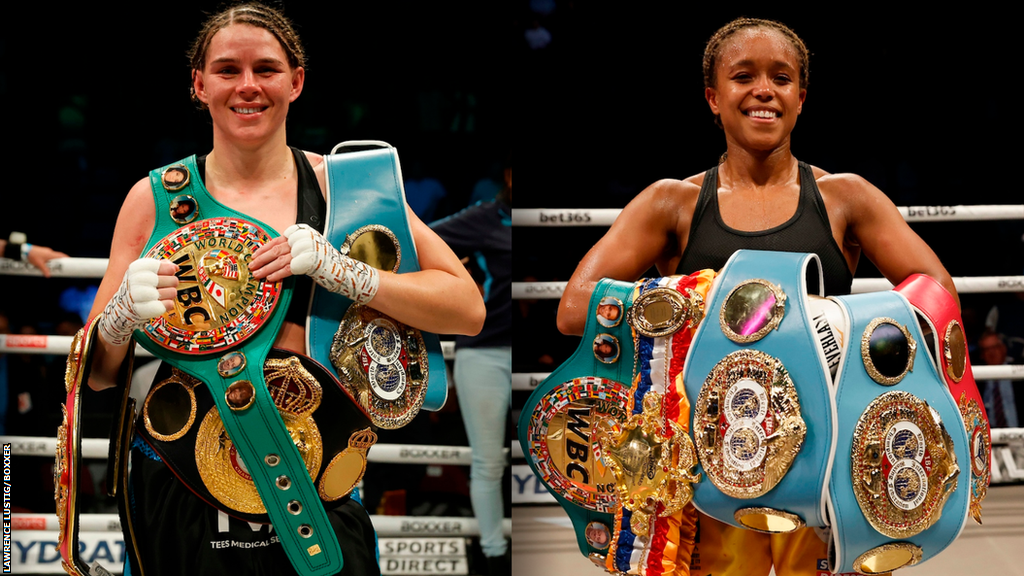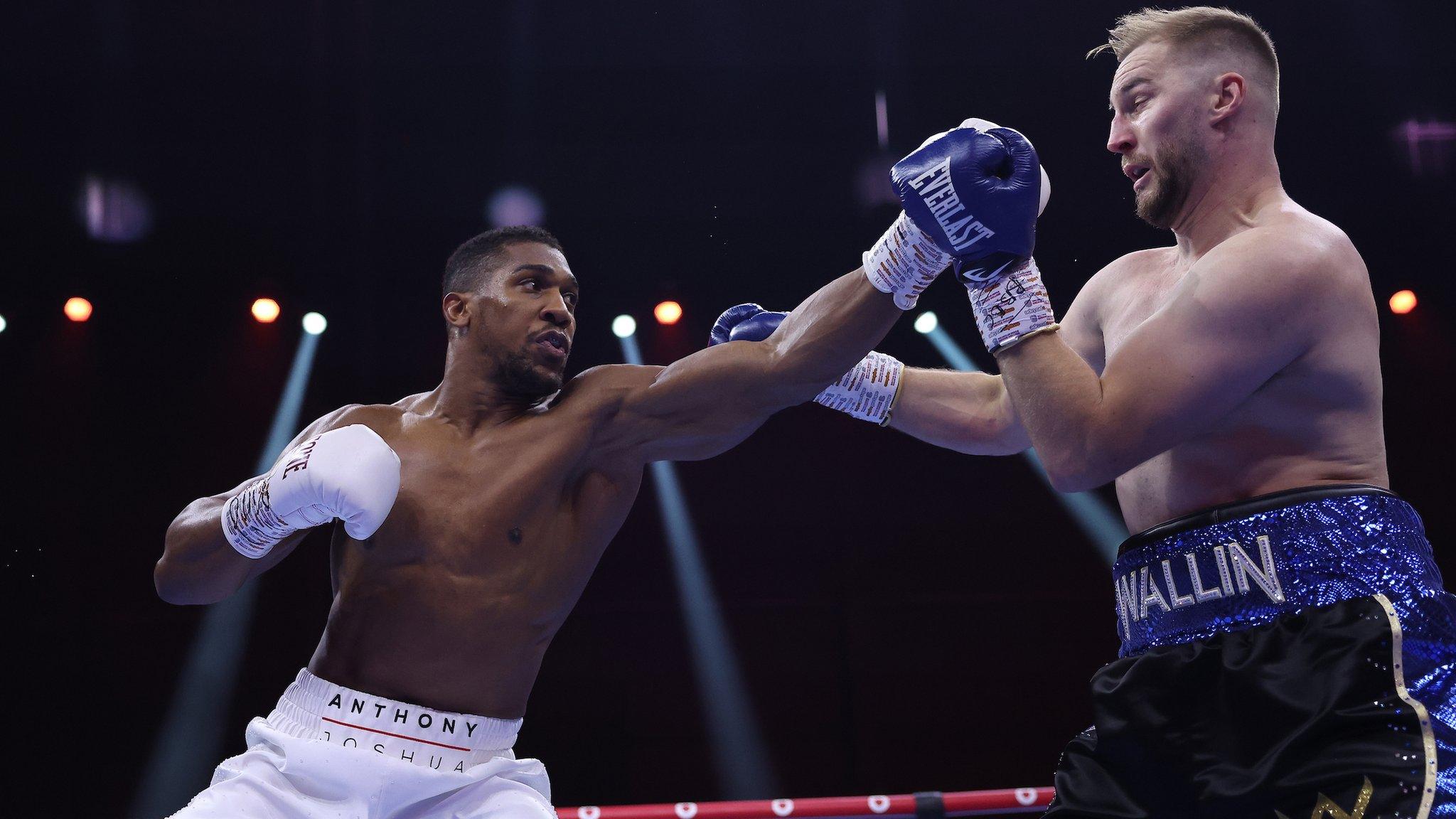Savannah Marshall & Natasha Jonas triumphs - golden era for boxing deserves more shine
- Published

Marshall (left) holds all four belts at super-middleweight and Jonas is a unified light-middleweight and IBF welterweight champion
On a momentous night for British boxing, female pugilism proved once again it is thriving in this country.
At Manchester's AO Arena on Saturday, Savannah Marshall became the undisputed super-middleweight champion by dethroning Franchon Crews-Dezurn, making her just the second English fighter after Chantelle Cameron to clean up a division.
Earlier in the night, Natasha Jonas - the first woman to box for Team GB at an Olympic Games - continued her legacy.
She won a fourth world title in as many fights, beating Kandi Wyatt for the vacant IBF welterweight strap. Jonas' recent flurry of world championship glory has occurred in just 16 months.
An undisputed world champion was crowned. A pioneer of female boxing in Britain strengthened her legacy.
Arguably, it is one of the greatest single nights of achievement for British boxing, certainly British women's boxing.
Yet only 8,000 tickets were reportedly sold, and there seemed to be significantly fewer inside the 21,000-capacity AO Arena, the largest indoor arena in the country.
Golden era lacking fanfare & coverage?
Marshall and Jonas' triumphs provided just the latest instalment of a remarkable period of success for British female fighters.
In the first six months of this year, Chantelle Cameron burst into the mainstream by beating Ireland's Katie Taylor in Dublin.
Ellie Scotney and Sandy Ryan have become world champions, and Terri Harper and Nina Hughes have successfully defended their world titles.
But there is undoubtedly a lack of ticket sales and fanfare afforded to what is a golden period for women's boxing.
This is not exclusively a female boxing problem and not necessarily indicative of the failings of any promoter or a lack of worthy fighters, but rather the current state of the sport as a whole.
Claressa Shields calls out Savannah Marshall after her win over Crews-Dezurn in Manchester
The UK has the fighters, has the world champions, but the shine they deserve is yet to come.
Shields-Marshall & Taylor are the anomalies
Marshall's previous outing was arguably one of the greatest nights in women's boxing. In the main event of an all-female card, the Hartlepool fighter suffered a first career loss to bitter rival Claressa Shields at London's sold-out O2 Arena.
It was the first time two female fighters had headlined at the O2.
After Marshall's win over Crews-Dezurn, Shields gatecrashed the post-fight news conference and demanded a rematch take place in the United States.
"Where we going to go? Your local leisure centre?", Marshall mockingly replied. She wants to have the rematch at the St James' Park football stadium in Newcastle, which holds 52,000 people.
The 'grudge' match narrative of their first fight engaged British boxing fans and a repeat is likely to do better numbers than if it took place in the US.
Is Jonas the most overlooked legend in boxing?
But Shields-Marshall, and most fights featuring superstar Taylor, are anomalous.
When Northampton's Cameron beat American Jessica McCaskill to become queen of the light-welterweight division in a historic moment for British boxing as a whole, it was in Abu Dhabi on an undercard.
When Essex's Hughes shocked Jamie Mitchell to win the WBA bantamweight belt it was in Dubai, with news only trickling through on social media rather than any major outlet following in real time.
Both wins gained little coverage back home, despite the significance of the achievements.
An issue across men and women's boxing
It took Cameron to fight - and beat - Taylor to gain the recognition deserving of her feats and talent. But it was Taylor's profile that sold the majority of the 9,000 tickets at Dublin's 3Arena.
Profile and selling power is key, and only a few British boxers, male or female, could hope to sell out the O2 or AO arenas.
Some will point to the lack of depth in female boxing as fair reasoning, while it is worth mentioning this is a problem across both men and women's boxing.
Heavyweights Tyson Fury and Anthony Joshua are perhaps the only stars who have the pulling power to attract a huge gate by their name alone.
Pick any opponent for Fury and Joshua out of the top 10 or 15 of their division and chances are you will sell out the AO or O2. The same can be said for Taylor, but only against a live opponent.
Fury sold 60,000 tickets in the dead of winter at Tottenham Hotspur Stadium. It didn't matter he was in a huge mismatch with Derek Chisora or it was three weeks before Christmas.
Those three names aside, though, there is a lack of crossover stars with a level of popularity which transcends the sport.
When Fury fought Dillian Whyte at Wembley Stadium in April 2022, a staggering 94,000 fans attended.
But Londoner Whyte's next fight, against Jermaine Franklin at the adjacent OVO Arena in Wembley, drew barely 6,000 fans.
Shields a fine example in self-promotion
'GWOAT' Claressa Shields and Savannah Marshall on pushing women's boxing
In June, the OVO Arena hosted three world title fights involving Britons, with the undefeated Sunny Edwards topping the bill. About 4,000 were in attendance.
The all-British title contest between Hughes and Katie Healy was bizarrely the first fight on the TV broadcast, at around 19:10 BST, with just a scattering of fans having taken their seats.
It doesn't help that less than a month before, the same venue was sold out for a Misfits boxing show headlined by YouTuber-turned-boxer KSI.
Misfits is not sanctioned by the British Boxing Board of Control and almost exclusively features fights between social media influencers and celebrities.
Its impact on the sport is a point of contention, and those cards don't necessarily attract hardcore boxing fans, but perhaps there is a lot that 'traditional' boxers could learn from 'YouTuber' fighters in self-promotion.
One champion who has somewhat mastered the art is the confident Shields, who goes by the alias 'GWOAT' - greatest woman of all time.
The Michigan fighter's name cropped up throughout the build-up of Marshall v Crews-Dezurn, long before she finally appeared in the flesh on fight night.
For Marshall to have any chance of a St James' Park show, she needs the GWOAT as her dance partner.
But even with their history, rivalry and seemingly genuine hostility, it may still be a tough ask. A challenge few British boxers, male or female, are equal to.
Related topics
- Published14 January 2024
